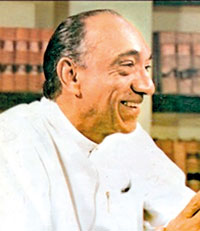Sunday Times 2
Ends to justify means and cry of bogey men
View(s):By Tassie Seneviratne
The article by Kishali Pinto Jayawardena, (KPJ) titled “The ends cannot justify means in nation-building”, that appeared in the Sunday Times of August 21st 2016, gives food for much thought.
My mind first went to a conversation I was privileged to have with a friend who was connected to President J.R Jayewardene (JRJ) through marriage of his sisters to two of JRJ’s brothers. The conversation centered on my contention that President JRJ retaining a five sixth majority in Parliament elected on the old system through a referendum defeating by legal jugglery the purpose of proportional representation introduced by President JRJ himself and enshrined in the constitution, was wrong. My friend agreed with my contention. About a week or so later my friend communicated to me President JRJ’s response to my argument. He had put my line of thinking to President JRJ and JRJ’s response had been that he agrees it is wrong, and asked my friend whom he has in mind to take over the Presidency. My friend had stated that there was none other but JRJ. JRJ had responded telling him, in which case, to leave it to him to do it his way, because it was the only way he can remain in power. Mrs. Bandaranaike’s coalition government that became unpopular because of the queues, escalating prices, non- availability of essential items etc. that dotted the country, was the bogey.
JRJ however failed to deliver because he was plagued by a terrorist war with the LTTE who believed it was the only means left to liberate the Tamils.
Shakespeare in many of his works brings out the universally established fact that ‘ends don’t justify the means’. In Julius Caesar he portrays Brutus as noble in character but unpractical and pedantic. Although the nobility of Brutus is unquestioned, the other conspirators with whom he conspired were prompted by jealousy and vengeance.

President J.R Jayewardene failed to deliver because he was plagued by a terrorist war with the LTTE
It is now accepted that the murder of Caesar was utterly base and senseless – base because it was mainly due to jealousy, and senseless because even Brutus who acted from pure motives was grasping at the impossible in his unpractical and futile attempt to restore the old order of Roman republicanism with other conspirators whom he himself described as base elements. Brutus should have realised at the outset that if the murder of Caesar was right, then the other deeds of violence and injustice which that murder necessarily entailed would be justifiable. The unstoppable wheel of crime and punishment caught up with Brutus too and he committed suicide leaving Rome in disarray. The bogey was dictatorship.
Ironically, what followed was the ascendance of Emperor Augustus Caesar who built the Roman Empire.
Christopher Marlowe in ‘Dr. Faustus’ effectively brings out the eventuality of ends and means of a different kind – complementing each other. Dr Faustus is a professor of divinity at Wittenburg as well as a renowned physician, astronomer and scholar. Not satisfied with the limitations of human knowledge and power and driven by extensive pride, he begins to practice necromancy. He eventually makes a deal with Lucifer whereby he exchanges his soul for twenty four years of the devils service to him. During this period he enjoys a lot of power, fun and frolic. But at the end of the twenty four years he is frightened but helpless and the devils carry him away. His unbridled ambitions and the means to achieve them led him to an unfortunate end.
Had Dr. Faustus lived today, he could have satiated his unbridled ambitions for power, fun and frolic by entering the Sri Lanka Parliament! As stated by KPJ in her article, the bogey men of the ‘Yahapalanaya’ band wagon are the Rajapaksas. The Rajapaksas are by no means a yard-stick to go by. That’s comparing with the devil incarnate. The ‘Yahapalanaya’ government must be judged by its own promises – the promises being, ending nepotism and corruption, reducing the cost of living, improving living standards of the people, independent police, independent judiciary, right to information and more.
Some of these promises have been fulfilled. But nepotism, corruption and cost of living are soaring to giddy heights. Bribing opposition members of Parliament with cabinet portfolios and perks that go along with it, at the expense of the people, in return for supporting the government – some of them being corrupt members of parliament rejected by the people but taken in through the national list; appointment of the former Governor of the Central Bank and his questionable deals; are glaring instances of nepotism and corruption, while a myriad other matters of contention regarding economic and environmental concerns remain unresolved.
We can see a repetition of Brutus’ character by a cultivated reputation for honesty, but engaging others to do the dirty work while remaining ‘Mr. Clean’. KPJ writes of another pertinent point raised by a conversationalist of hers – “why should compromised groups which clearly have an agenda in riding along on the Yahapalanaya band wagon as it were, be allowed to drive these debates?” Some of these compromised individuals were activists in “People power for good Governance.” They now hold lucrative positions in the Yahapalanaya Government and are singing for their supper, nepotism, corruption etc. notwithstanding. “People Power for Good Governance” will have to take stock of this Faustian bargaining – “base means to mean-ends” and forge ahead sans opportunists, till people power becomes a reality.
(The writer is a retired Senior Superintendent of Police.)

